
As a Royal College, we are responsible for postgraduate training of paediatricians in the UK and run the membership (MRCPCH) and Diploma of Child Health examinations. But paediatric training has been a focus since our days as the British Paediatric Association (BPA).
From the very beginning of the BPA there was a focus on knowledge sharing. At the first Annual Meeting (these days known as RCPCH Conference) much of the two days was focused on presentation of scientific communications (with some time set aside for golf, of course!).
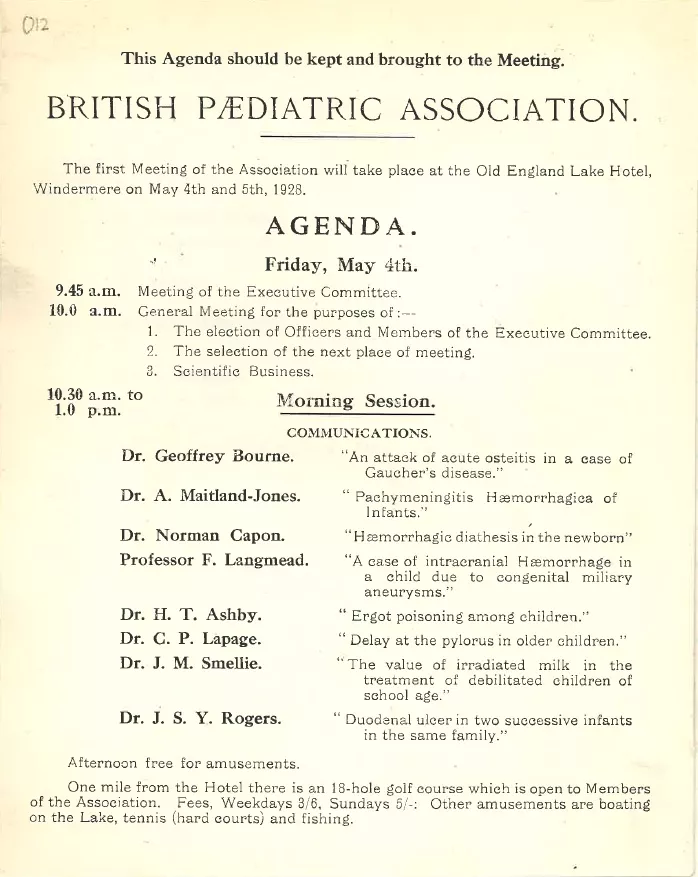
By 1932, the BPA was submitting proposals to the General Medical Council (GMC) for examination in paediatrics and childhood disease, and in the following years attempted to get the Royal College of Physicians to include questions in their final exams on the diseases of children. However, Dr Still notes he "did not appear to be in the least hopeful of the outcome of this attempt".

The BPA’s attention to education continued through the Second World War, contributing to the inter-departmental committee on medical schools with a memorandum on increased training for undergraduates in paediatrics in 1942. And in 1943 members suggested improvements in paediatric teaching in university and reporting on the provision of paediatrics in medical school curricula.
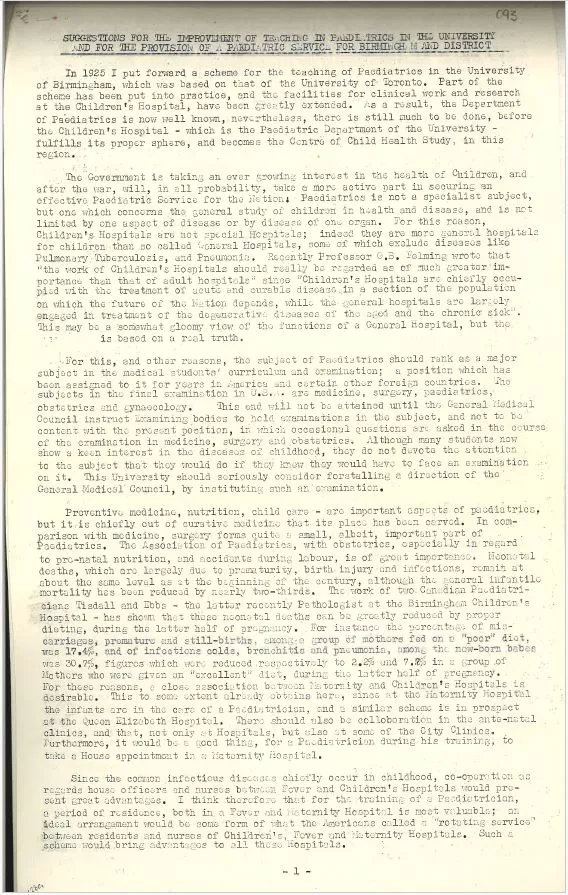
In 1964, Sir Alan Moncrieff (former BPA President) obtained funds from International de l’Enfante in Paris for a survey of Paediatric undergraduate teaching in the UK, resulting in a report by Tony Jackson (in whose memory we have a medical student prize) which later contributed to a symposium on The Role and Training of Paediatricians in Britain in 1968.
Committees were essential to the work of the BPA in advocating for improvements in training and education. In 1950 a Sub-Committee on the Training of Paediatric Consultants considered minimum training periods and curriculum, and contributed to an International Paediatric Association / World Health Organization research study of paediatric education.
A Standing Committee on Education was established in 1963 "to consider undergraduate and graduate training in paediatrics". In its first year the committee produced a memorandum on Careers in Paediatrics. Its functions were transferred to the Academic Board in 1966, which would go on to organise the RCPCH Conference (known as the Annual Scientific Meeting at the time), advise on postgraduate training, promote research and assemble advice on specialist paediatric subjects.
Prior to the establishment of RCPCH, the Academic Board established a Continuing Medical Education (CME) programme, formalising the structures for ensuring knowledge remaining up to date. As early as 1994, the BPA wrote a document for discussion about CME, noting that it was likely to be an essential requirement for continued specialist certification. Now of course the process has evolved into Continuing Professional Development.

The BPA also took an interest in ensuring international students were prepared for training in the UK. In 1968, the Overseas Committee published the first edition of a pamphlet, Paediatric Training in the United Kingdom, aimed at visiting paediatricians from outside the UK.
They also looked beyond just medical paediatricians, such as reporting with the Royal College of General Practitioners (RCGP) on the paediatric training required by the General Practitioner in 1976 and providing recommendations on the postgraduate training of child psychiatrists in 1977.

As a Royal College, we are responsible for postgraduate training of paediatricians in the UK and run the membership (MRCPCH) and Diploma of Child Health examinations. Prior to this, these exams were run by the Royal Colleges of Physicians.
The Diploma in Child Health (DCH) was first established by the Royal Colleges of Physicians of London and the Royal College of Surgeons of England in 1935 (transferred wholly to the RCP in 1981), and was not intended to be a qualification for a consultant in paediatrics. The other Royal Colleges of Physicians later introduced similar exams. BPA members were heavily involved with the DCH at various times, and now of course RCPCH runs these exams, the completion of which recognises competence in the care of children in specialties allied to paediatrics.
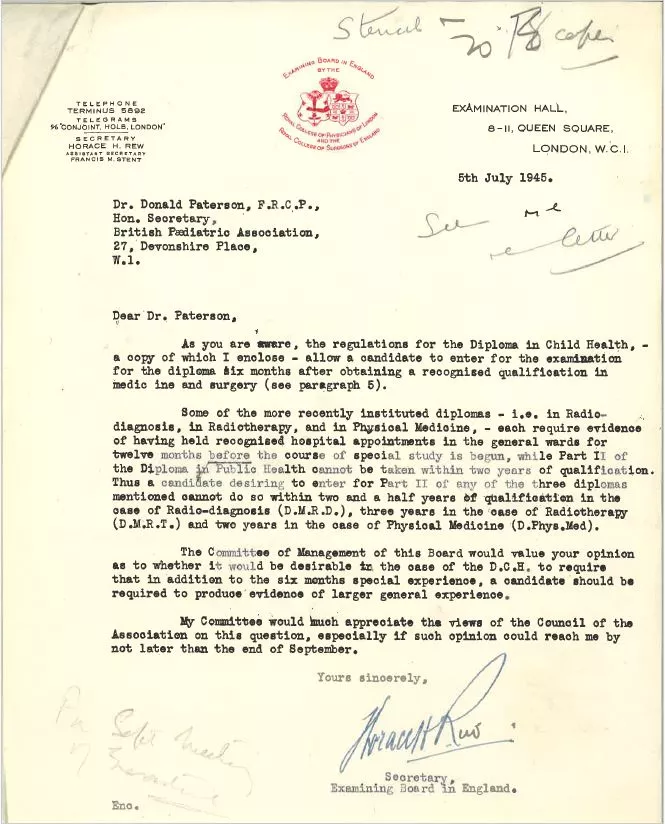
Paediatricians did not have the option of an MRCPCH exam throughout most of the 20th century – instead they would need to pass the examinations for Membership of the Royal College of Physicians, which in earlier years primarily focused on adult medicine.
In 1970 John Forfar (future BPA president) proposed a paediatric MRCP to the Edinburgh RCP. They agreed, but in 1972 the three RCPs decided to have a common MRCP (UK) exam and Edinburgh fell in line with the others. This new MRCP (UK) would consist of a Part 1 and Part 2 exam, and the BPA recommended that Part 2 should have the option to be wholly in paediatrics, which fully ensued in 1977.
A joint working party of the British Paediatric Association and RCPs was spearheaded by Professor Dame June Lloyd (BPA President) and led to a paediatric option for the Part 1 exam beginning in 1993. Half of the exam focused on general medicine and the other half focused on clinical science and practice of importance to paediatricians.
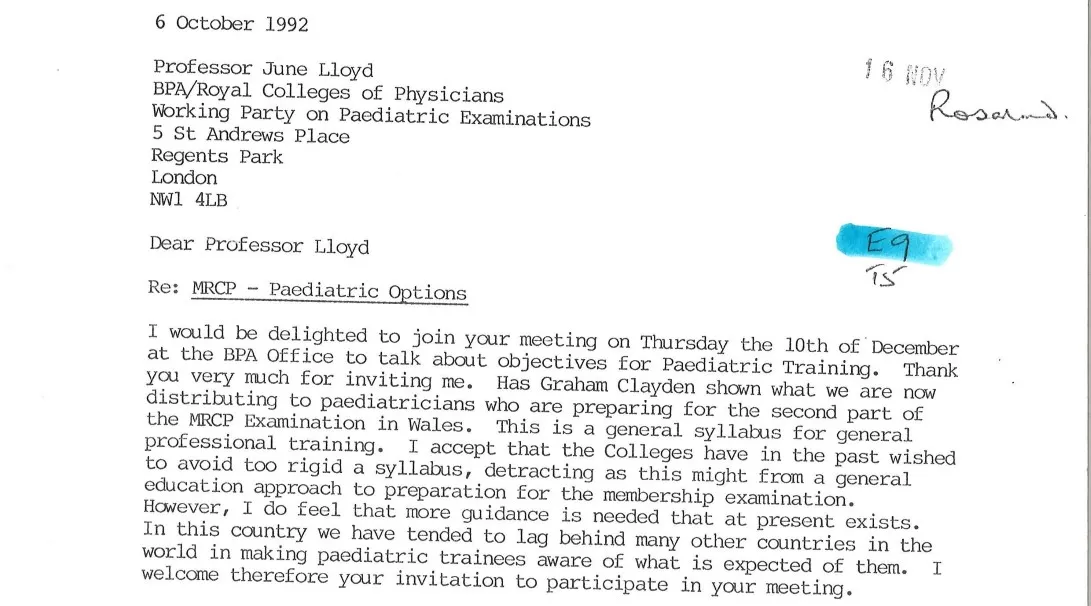
Of course, during this time members were moving towards becoming an independent college, and in 1996 the RCPCH was formed. The handover of the paediatric exams was gradually orchestrated. By 1999, the RCPCH ran DCH and MRCPCH part 1 examinations and we were working on part 2.
RCPCH has continued to evolve and develop our education and training activities. In 2004, the MRCPCH Clinical Exam was remodelled and in 2008 the first MRCPCH exam ran in Egypt. The DCH exam was updated in April 2011 and in 2015 RCPCH became the first College to deliver all theory exams online.
ePortfolio was established in 2007, with a new version launched in 2016. In 2018 a new curriculum was introduced: RCPCH Progress, transitioning into RCPCH Progress+ in 2023.
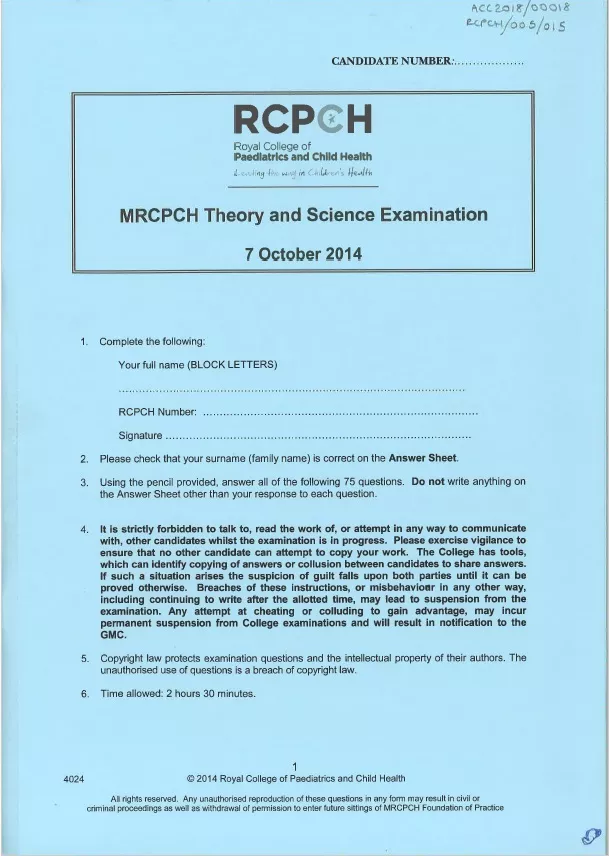
Interested to learn more about the College's rich history and its archive?
Our website has more information about the history of the College. You can also access our online Archive Catalogue, where you can see the records we hold about our past as the British Paediatric Association (BPA) and a Royal College, and of the history of child health.
The Archive team will also be at RCPCH Conference this year - come and see us at our stand in the exhibition hall to learn more about our history and archives.
We also have a small exhibition about the history of the Annual Conference in the Members' Room at the moment, so do have a look next time you visit the RCPCH office in London.
If you would like to access the archives, or you would like more information about our history and archives, please contact us on information.governance@rcpch.ac.uk.









